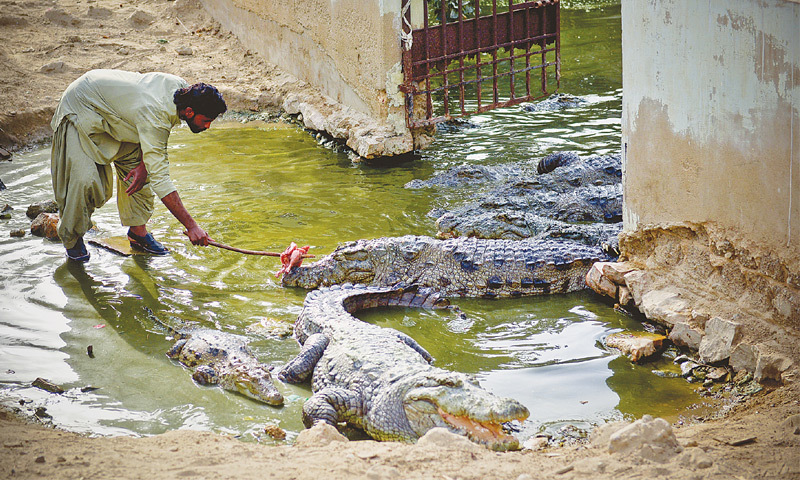ADJACENT to the mazaar, a maze of concrete structures has sprouted over the hilly terrain that was once the hub of dhamaal, a vibrant facet of the four-day Sheedi Mela at Karachi’s Manghopir shrine.
Where not too long ago the air was filled with drumbeats and crowds of worshippers danced late into the night, now one’s ears are assailed by the noise of heavy trucks carrying marble slabs. Several shops stand in the narrow alleyway going down the shrine. Once, it used to teem with humanity but now, forlorn sellers stand with their wares with hardly a buyer dropping by.
Patronised by the Sheedi community residing in Sindh and Balochistan, the Sheedi Mela had an enduring appeal and was one of Karachi’s cultural highlights.
But for the past five years, says Mohammad Yaqoob Qambrani, only fear and encroachments have prospered in Manghopir. This is what has replaced the devotees and visitors that used to congregate at the shrine of the 13th-century saint Hazrat Sakhi Sultan Baba Manghopir.
“We last organised the mela in 2010,” says Qambrani, the Sheedi community leader, as we make our way to the shrine from his home in Lyari. “No one threatened us. The government never issued any directive. But the security situation and the overall environment had become such that community elders decided to halt festival activities for a while.”
That “while”, however, continues since the situation in the neighbourhoods around the shrine has deteriorated to such an extent that festival organisers like Qambrani prefer visiting the mazaar during the day and returning home before the sun sets.
“Even now, the local administration doesn’t want us to arrange the mela,” he says. “They cite security threats. We can’t disagree with them as over the past few years some elements have crept into this neighbourhood that pose a serious threat to the centuries-old tradition.”
Sakhi Sultan, the Sheedis believe, was the Hindu highway robber Manga Ram who after meeting four saints of his time, Baba Fariduddin Ganj-i-Shakar, Lal Shahbaz Qalandar, Bahauddin Zakaria Multani and Baba Ghor, had a change of heart.
The Manghopir shrine is dotted with miracles associated with each saint. A pond swarming with crocodiles is one of them. Nearby is a hot water spring that, it has been believed for centuries, cures skin diseases.
But interacting with devotees at the shrine leaves me with the feeling that the wounds left by the recent wave of militancy and violence may take quite some time to heal.
I meet Akbar at the waterhole. He is waiting for a devotee to bring chicken as nazrana [offering] for the reptiles. This is the first time in a week that they’ll get fresh meat, he says.
“Gone are the days when we got such nazrana nearly every day,” he says. Akbar has been looking after the pond for more than a decade as a contract employee of the Sindh Auqaf department, which manages the province’s prominent shrines. “Now it happens only once or twice a week. Beyond that, we buy food for them from the market with whatever donations we get.”
As we talk, a jeep pulls up containing baskets of fresh chicken. Akbar hurriedly enters the pond premises with his two aides, each of them carrying wooden skewers with pieces of chicken for the crocodiles.
Inside the mazaar a few people offer fateha. Shuja Hussain is among them with his wife and four siblings. “We live in Korangi and used to visit this shrine at least once a month or two until a few years ago,” he says. “But now we rarely visit. I got married recently, so today we came here only for haazri.”
The ‘city situation’ Shuja can’t explain but moves his hand to signal the growing unchecked population around the shrine and says: “Don’t you see how congested and strange this place has become? Many of us don’t feel comfortable coming here. Despite the occasional news report about these neighbourhoods, I have hardly seen any police van.”
Outside the mazaar chamber, Faiz Muhammad offers them nuquls (sweets) as they depart. Having spent his days at Baba Manghopir’s shrine for decades, the 70-year-old devotee has witnessed the barren land around becoming densely populated.
“Karachi became a megalopolis but not Manghopir,” he says. “We have been hit by a double-edged sword: governments’ negligence and militants’ extremism. The Sheedi Mela is not held because of the security threat and the number of visitors has dropped amid depleting infrastructure.”
Once home to two residential facilities — Allah Bachayo Goth and Sheedi Goth — Sultanabad in Manghopir is now burgeoning with several irregular neighbourhoods and is in the news mostly for grim reasons.
“Two days ago, an operation was carried out by the Rangers in the Sultanabad area,” says Ali Shah, depositing ice on roses at his flower stall. “Rumours are they came for militants who attacked a senior police officer recently. Some thought there were militants holed up in the area who were planning attacks in Muharram. How can one live and earn in a situation like this?”
The threat to the shrine is not new. Manghopir’s shrine was closed for a couple of days in 2009 when provincial authorities received intelligence reports about possible militant attacks. The October 2010 attack on Abdullah Shah Ghazi’s shrine killed at least eight people and left dozens injured.
Nevertheless, Qambrani has not lost hope. “We are making efforts to resume the Sheedi Mela next year,” he says. “I have met officials in the Sindh cultural ministry. We are proud of our traditions and this is the only festival that will help us bond. We simply can’t give it up. We just can’t.”
Published in Dawn, October 19th, 2014












































